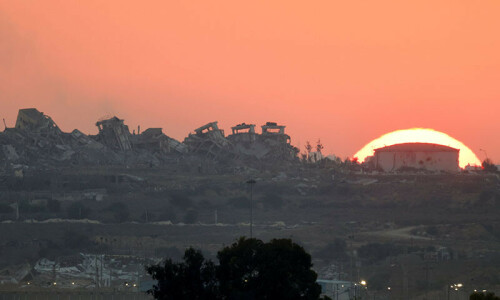
LONDON: Somalia has replaced Iraq as the state most at risk from terrorist attack, according to a ranking by global analysts Maplecroft, which sees threats also rising in Russia, Greece and Yemen but falling in India and Algeria.
A statement by the consultancy about its latest Terrorism Risk Index said increased dangers seen in Somalia and Yemen were caused by al Qaeda-associated violence while those in Russia stemmed from attacks by separatists from the North Caucasus.
The largest change in the rankings was Greece, which moved from 57 to 24 to become the European country most at risk, a trend the consultancy said was due to violent left-wing groups.
Pakistan, where more than 2,000 people have been killed in a wave of deadly attacks by extremist militants since 2007, moved up one place to become the country second most at risk, while neighbouring Afghanistan slipped from second place to fourth.
Iraq, where sectarian carnage unleashed after the 2003 US-led invasion is receding, is now in third place.
Security experts say the global risks posed by hardline extremist groups were most recently underscored by al Qaeda’s claim of responsibility for the planting of explosives on cargo planes flying to the United States from Yemen last month.
Maplecroft said Somalia suffered 556 terrorist incidents, in which 1,437 people were killed and 3,408 wounded, between June 2009 and June 2010, the period on which the rankings are based.
“Somalia is the most extreme risk country,” it said. “It has the highest number of deaths from terrorism per population and surpassed Iraq and Afghanistan in the number of fatalities per terrorist attack.”
Failed Cargo Plane Attack
Maplecroft said much of Somalia’s violence was attributable to the al Qaeda-aligned al Shabaab militant group, which has been fighting a weak transitional government for three years and now controls swathes of the south and centre of the country.
Yemen, across the Gulf of Aden, worries the West because it is home to al Qaeda in the Arabian Peninsula, which claimed the failed cargo plane attack and a botched plot by a Nigerian student to bomb an airliner over Detroit on Dec. 25 2009.
The UK-based company’s index rates 196 countries on the number, frequency and intensity of terrorism attacks, plus the likelihood of mass casualties occurring. While based on historical data, it is intended as a forward-looking assessment.
The index’s reporting period partly overlaps with calendar 2009 data used in a previous ranking issued in Feb. 2010.
None of the main Western economies fall within the ranking’s high or extreme risk bracket. The United States is at 33, France 44 and Britain 46 — all in the medium risk category — while Canada at 67, and Germany at 70 are rated as low risk.
The index lists 16 countries as extreme risk — topped by Somalia, Pakistan, Iraq and Afghanistan and followed by the Palestinian Territories in fifth place, Colombia 6, Thailand 7, Philippines 8, Yemen 9, Russia 10.
The company stated an increase in risk in Russia, which rose to 10 from 15, was due to a rise in big attacks by separatists from the North Caucasus including twin suicide bombings on the Moscow metro in March 2010 which killed 40 people.
Other major movers in the index included Algeria, which fell to 36 from 7, and India, which dropped to 15 from 6.














































Dear visitor, the comments section is undergoing an overhaul and will return soon.